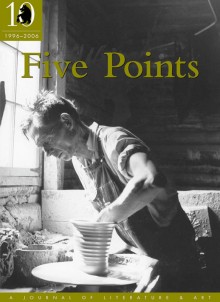Five Points, Vol. 10 No. 1&2
Fall - Spring 2006From Mary Lee Settle, “I demand irony from my reader. You know more than the people in the books know.”
Sample Content
Ann Beattie
The French Officer
“I don’t know,” Janet said. “Maybe Abe’s another Truman Capote and we’re grist for the mill.”
“Right. And we’re in La Côte Basque,” Iris said wryly.
That was the thing about their friendship: they could speak almost in code and understand each other. They were in an inexpensive Italian restaurant near New York University Hospital, on their way to visit their friend Peggy. A while ago, Abe had excused himself and left the table. He had been kind enough to drive them from Connecticut to New York because two days before Janet had turned her ankle, and Iris had never learned to drive. The ankle was swollen; she could feel it throbbing beneath the elastic bandage.
Iris was spending June back in the U.S. It was her husband’s last year with the Navy. He would retire with a good pension. It was his plan to open a water sports business in Key West.
Janet thought, sometimes, that life could be thought of as one long round of being served in restaurants. Why didn’t someone write a novel about that? Real life was lived waiting on barstools and showing off your pretty legs in stockings you took care not to snag; re-applying make-up in big Ladies room mirrors, where, in your peripheral vision, prettier women hovered like putti, with their lipsticks and brushes. What you thought of the waiter was a litmus test of who you were: could you be made insecure by a waiter’s perfunctory attention if you had no penchant toward paranoia? Did it mean something if you were secretly relieved the waiter was gay?
Abe was the nineteen-year-old son of one of her husband’s friends, James Wyer. James was her friend, too, but he wasn’t a friend the way Iris was. He wasn’t a friend the way a woman could be. At the beginning of summer, her husband had left her a note: “Honey—Abe is going to cut our grass today. Already paid him. P.S. This is proof I’m not such a megalomaniac that I have to cut the grass.” “Not” was underlined three times.
Abe had begun to come every week to mow the lawn. He loved to read, and he and she had struck up long conversations about books on the back porch, when he finished work, drinking iced tea she’d made the night before and let brew in the refrigerator. The inside of the refrigerator was a study in activity masquerading as inactivity: the ice maker spewing out cubes; tea brewing; apple juice fermenting. So much going on—how deceptive, that when you opened the door there seemed to be such stillness.

